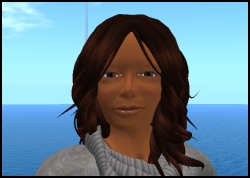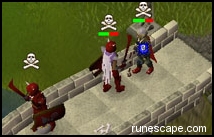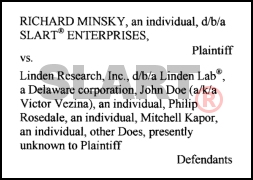Quicklinks: The Avatar Wasn’t Really Murdered…
October 24th, 2008 by Benjamin Duranske
Virtually Blind periodically runs “quicklinks” — items that are not long enough for a full story, but are worth a click. Here’s the current batch.
 Have to start here, since about fifty readers have emailed this to me: the Associated Press wins the cringe-inducing-virtual-law-headline-of-the-month award for “Woman Jailed after ‘Killing’ Virtual Husband” instead of the more accurate (but way less fun) “Woman Jailed after Deleting Online Friend’s MapleStory Character.”
Have to start here, since about fifty readers have emailed this to me: the Associated Press wins the cringe-inducing-virtual-law-headline-of-the-month award for “Woman Jailed after ‘Killing’ Virtual Husband” instead of the more accurate (but way less fun) “Woman Jailed after Deleting Online Friend’s MapleStory Character.”
IBM’s Steve Mortinger has written a great article entitled “An Avatar’s Bill of Rights.” It’s less comprehensive but more specific than Raph Koster’s widely-referenced “A Declaration of the Rights of Avatars” and they sort of go hand in hand. One of Mortinger’s Principles: “Platform providers will either: 1) enable each users’ ability to move items and avatars between virtual worlds (i.e., platform portability), especially for IP rights retained by users per the ToS; or 2) upon request offer to allow users to copy or to provide users with a copy of their avatar and created content in an industry-standard format.” Interesting stuff.
Along those lines, The Escapist recently ran an article entitled “We the Gamers” that argues, among other things, that virtual world and game developers would be better off embracing the fact that there’s value in virtual stuff instead of fighting it. [Thanks to reader Brandon Brown for the heads-up.]
The lawyer magazine “ABA Journal” ran an article on virtual law. The article features my book, Virtual Law, which is pretty cool (and have I mentioned that there are only 62 shopping days to Christmas?) I’m seeing more and more coverage of virtual worlds where the author doesn’t find it necessary to kick off with a description of detachable genitals. That’s kind of nice.
Law360 also ran an article on virtual world intellectual property issues (free trial subscription required) in which I’m quoted regarding trademark misuse.
VERN (the Virtual Economy Research Network) has its new blog up and running. It will mix original content with reposts from other blogs, including Virtually Blind, Terra Nova, and others.
PopMatters has a good article on the future of video game litigation. It’s one of those “I’m not a lawyer…” articles, but it’s surprisingly nuanced on the legal points, and as an added bonus, it’s very readable.
 Not directly related to virtual law, but litigators will instantly see obvious justification for seeking documents from virtual world providers in all sorts of cases based on this interesting use of XBox Live logs: “Occasionally, there might be a case where somebody claims they did not commit a crime because they were playing Halo, in which case the subpoena might take the stance of, were they playing Halo at the time? It’s that type of stuff, but it’s pretty rare. [...] I can’t go into the details that we provide to satisfy the subpoenas but in general we can provide law enforcement with the information they need.”
Not directly related to virtual law, but litigators will instantly see obvious justification for seeking documents from virtual world providers in all sorts of cases based on this interesting use of XBox Live logs: “Occasionally, there might be a case where somebody claims they did not commit a crime because they were playing Halo, in which case the subpoena might take the stance of, were they playing Halo at the time? It’s that type of stuff, but it’s pretty rare. [...] I can’t go into the details that we provide to satisfy the subpoenas but in general we can provide law enforcement with the information they need.”
A site called the “LawMarketing Portal” has an article called “Raising your Profile on Second Life.” The article doesn’t break any new ground, but it is worth noting that virtual worlds are now being directly pitched to mainstream lawyers as marketing tools.
Finally, a bit off-topic, but Alltop’s virtual world news amalgamator just keeps getting better. This is a great resource for people like me, who avoid RSS because we like to see things in their original formatting.
Related Posts on Virtually Blind
- California Lawyer Cover Story on Virtual Law: "This month's issue of California Lawyer features a cover article on..." (1 comments)
- Virtual Law Quicklinks: Emptying the Linkbucket: "Virtually Blind periodically runs “quicklinks” — items that are not..." (2 comments)
- Air Force Professor Says Supreme Court Okays Spying on Avatars — Help Track Down Mystery Case and Get a Signed Copy of Benjamin Duranske’s “Virtual Law”: "A reader sent me a link last week to a pretty incredible article in..." (20 comments)


 Tamiko Franklin: VIPO is a not for profit with the purpose of providing access to information, representation, as well as advisory and legal services support relating to intellectual property registration, enforcement and dispute resolution for virtual world residents and digital entrepreneurs.
Tamiko Franklin: VIPO is a not for profit with the purpose of providing access to information, representation, as well as advisory and legal services support relating to intellectual property registration, enforcement and dispute resolution for virtual world residents and digital entrepreneurs. Our friends at MindBlizzard report that
Our friends at MindBlizzard report that  One aspect of the case is particularly intriguing — according to MindBlizzard, “the lawyers argued during the meeting that virtual goods do not really exist, and transferring [them] does not conflict with the rules of the game, but the court thought otherwise.” The Associated Press
One aspect of the case is particularly intriguing — according to MindBlizzard, “the lawyers argued during the meeting that virtual goods do not really exist, and transferring [them] does not conflict with the rules of the game, but the court thought otherwise.” The Associated Press  Linden Lab has filed an
Linden Lab has filed an 